Yukon Gold Cinnamon Rolls with Perfect Icing {Step-by-Step Tutorial}
These Yukon Gold potato cinnamon rolls are fluffy and delicious, and the simple mashed potato mixture is worth the {easy} extra step. It keeps the dough so soft and moist for days!
I know I say this a lot, but I had no intention of posting another cinnamon roll recipe. In December of all times. The month notorious for overloading all of us with Christmas cookies and decadent treats.
But in honor of special holiday breakfasts AND general cinnamon roll cravings AND the ongoing desire to provide you with the best of the best of the best, you should probably sit up and take note of this cinnamon roll recipe.
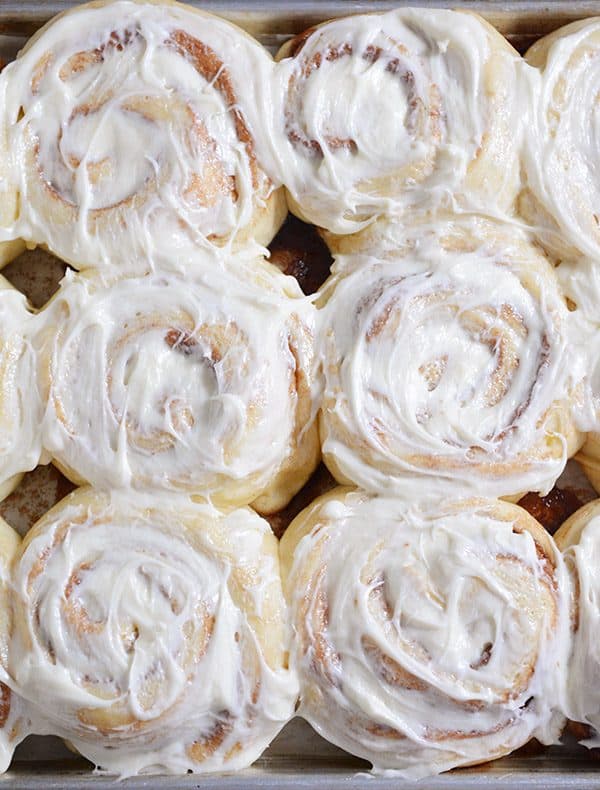
I understand that for many of you, trying a new cinnamon roll recipe feels very traitor-ish, especially if you’ve already found “the one” in Gloria’s perfect cinnamon rolls (that have quite the cult following).
Or maybe your cinnamon roll love is these vanilla pudding cinnamon rolls or these buttermilk cinnamon rolls or these crazy delicious biscuit cinnamon rolls. Each one of those recipes, respectively, has a set of very loyal fans.
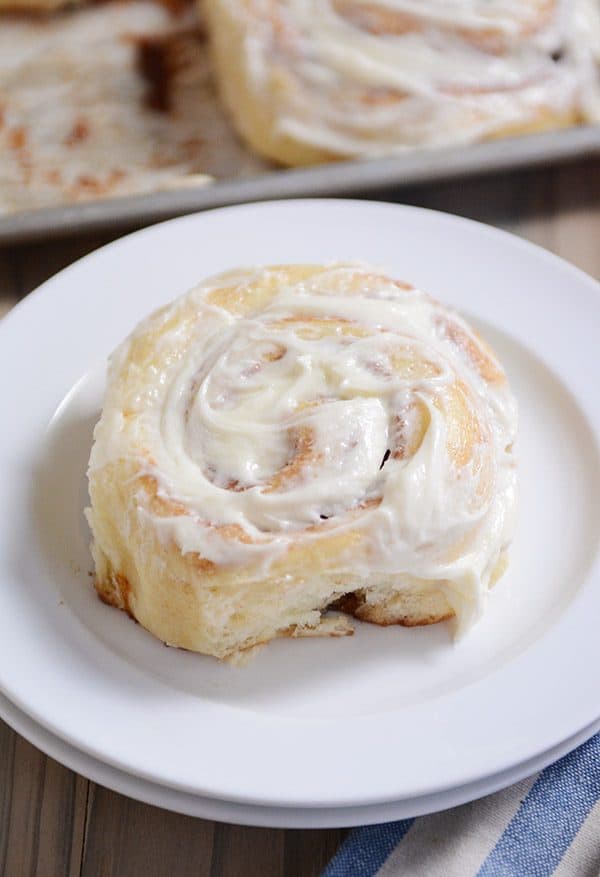
As one who sincerely adores each of those recipes mentioned above, it takes a lot (a lot, a lot) to rock my cinnamon roll-loving life. And these Yukon Gold potato cinnamon rolls have done just that.
Anna, a MKC reader, emailed me telling me that I should definitely try these cinnamon rolls to add to my already overflowing cinnamon roll recipe library. When she told me they were THE SOFTEST cinnamon rolls she had ever had in her life, I knew I had to try them.
And…Well, what can I say, I’ve made them five or six times in the last month and a half. They are amazing. Amazing, amazing, amazing.
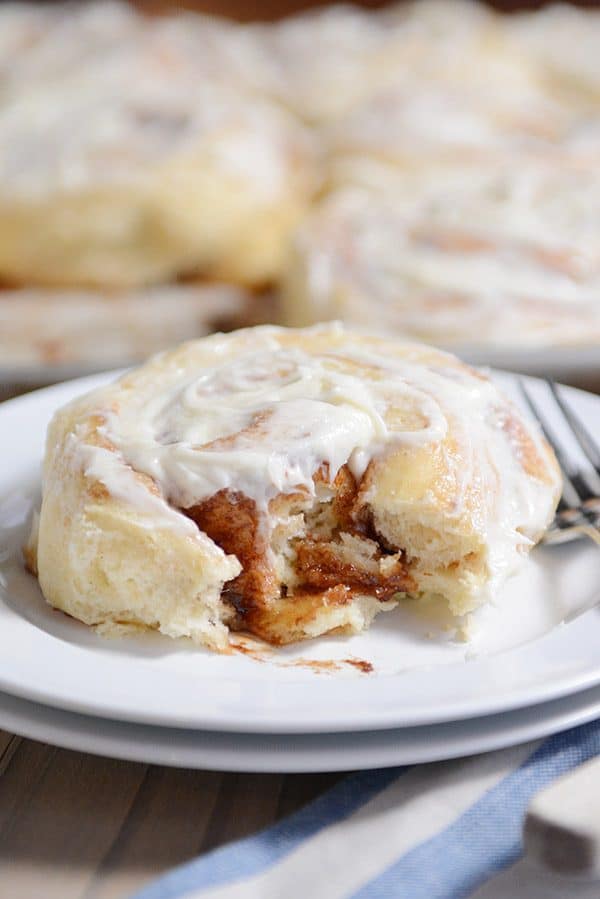
If you’ve ever used a mashed potato mixture in bread dough before (these unreal buttermilk potato dinner rolls come to mind), you’ll know that it yields an incredibly soft texture in the dough.
And these Yukon Gold cinnamon rolls are no exception. The dough is luxuriously soft and so easy to work with (see notes in the recipe about flouring the dough just right!). Even after baking, the rolls stay amazingly soft and fresh for much longer than any other cinnamon roll recipe I’ve ever made.
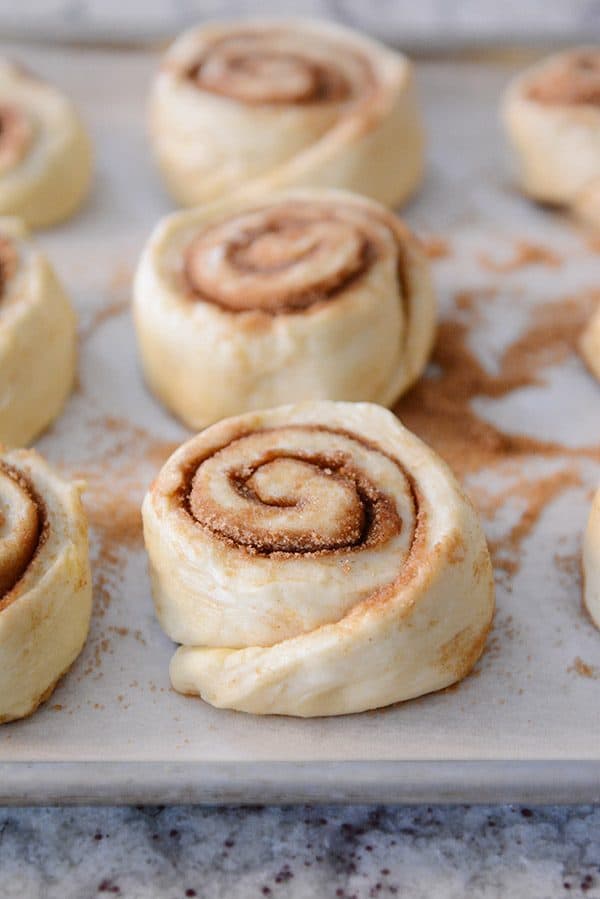
A couple other key changes to these cinnamon rolls (other than the mashed potatoes):
Theres a little bit of flour mixed in with the cinnamon and sugar. Kind of weird, I know!
But I actually really liked the effect! I get tons and tons of comments and questions about why cinnamon rolls sometimes gap after they are baked and cooled. Has that happened to you?
There are a lot of factors that can contribute to this. But a few things I’ve stumbled on in my research (cinnamon roll research is a very worthwhile endeavor, FYI) is that using too much butter in the filling can cause gappage. As well as rolling them up too tightly (stretching the dough along the way) – this causes the dough to shrink as the rolls cool, and that’s when those gaps appear.
Another factor is the amount of brown sugar/cinnamon used in the filling (using granulated sugar can reduce gappiness, but I don’t like the flavor as much as brown sugar).
For this Yukon Gold potato cinnamon roll recipe, I think the addition of flour to that cinnamon and brown sugar filling helps with the gapping (I’ve never thought of adding it before now) so the rolls stay tight and picture perfect.
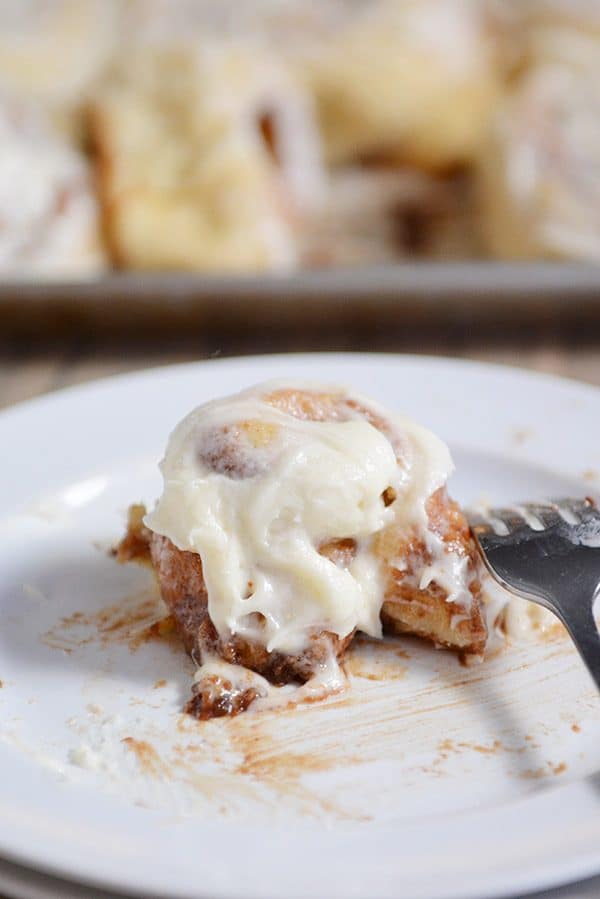
The second change is the cinnamon roll icing.
Each of the cinnamon roll recipes I have on my site have a slightly different cinnamon roll icing variation. And I love them all for different reasons (that maple frosting is to-die for).
But in my quest to…well…reinvent the wheel…I’ve been wanting to find a perfect, go-to cinnamon roll icing. One that is the perfect balance between a frosting and a glaze with a taste that is both creamy and sweet (without an overpowering cream cheese flavor).
Anyway, I suppose not everyone is as excited about these kinds of details as I am, but I’m happy to report that the frosting on these Yukon Gold potato cinnamon rolls is IT. Like, the one. The best cinnamon roll icing ever.
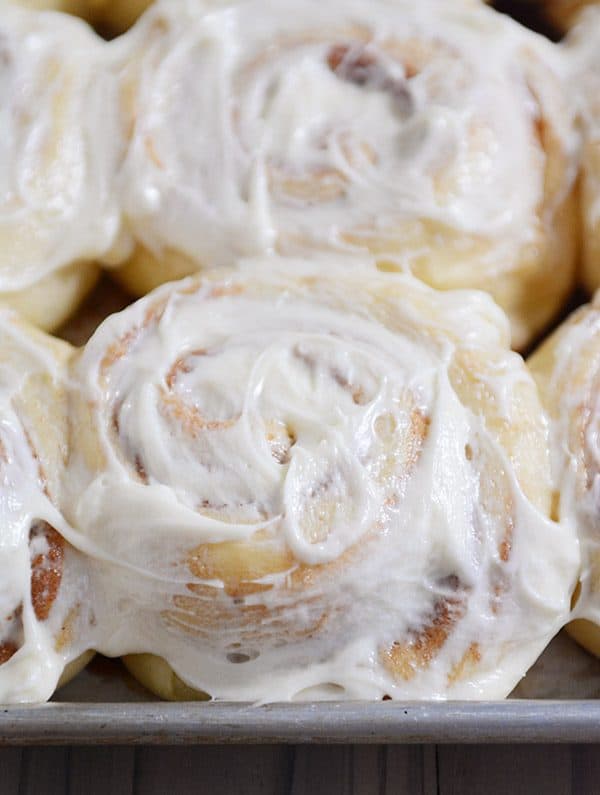
Not to get all super cinnamon roll nerdy on you or anything, but the key is to let the cinnamon rolls cool for, oh, maybe 15-20 minutes and then slather on the icing. The touch of warmth left in the cinnamon rolls ensures that the delectable icing melts down into all the nooks and crannies while still staying thick and creamy on top of the rolls.
Seriously, these cinnamon rolls are perfection.
Also, just like most cinnamon rolls, they can easily be made ahead of time! Make them, shape them, and pop them on a baking tray. Cover and refrigerate overnight, and then take them out in time to puff and rise and then bake.
I’m guessing they would also freeze well, too (I share another great freezing tip in the directions of this recipe).
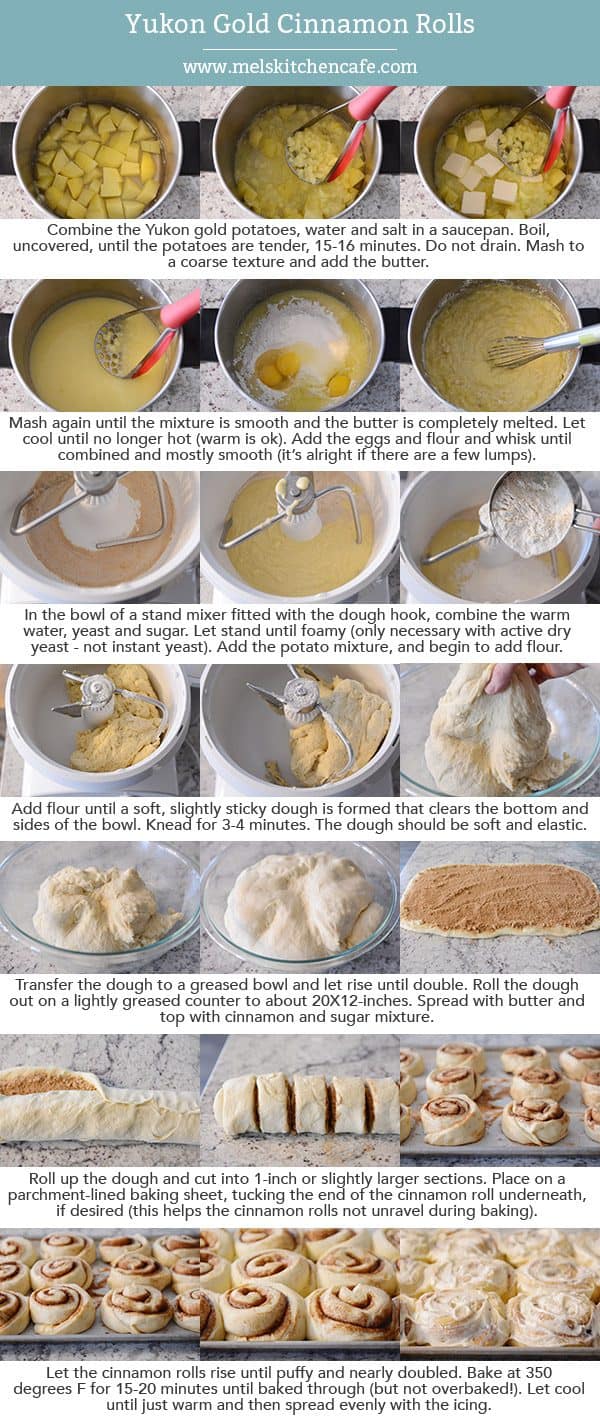
How to make these cinnamon rolls ahead of time
This post on making cinnamon rolls ahead of time applies perfectly to any sweet roll!
One Year Ago: Sticky Toffee Pudding Cake
Two Years Ago: Streusel-Topped Cranberry White Chocolate Bread
Three Years Ago: Maple-Spice Cashew Brittle {Super Easy Microwave Version}
Four Years Ago: Roasted Cauliflower and White Cheddar Soup
Five Years Ago: Toffee Crunch Cupcakes
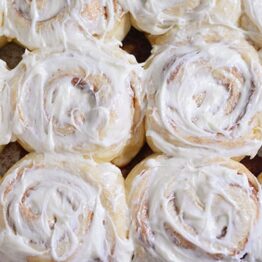
Yukon Gold Cinnamon Rolls
Ingredients
Dough:
- 1 pound Yukon Gold potatoes, about 3-4 medium potatoes, peeled and cut into 1-inch cubes
- 2 cups water
- 1 tablespoon coarse, kosher salt
- ½ cup (113 g) salted butter
- 3 large eggs
- 5 ½ to 7 cups all-purpose flour, divided, meaning you’ll use 1 cup first and the rest later (see note for UPDATE)
- ½ cup warm water
- ¼ cup (53 g) sugar
- 1 ½ tablespoons instant or active dry yeast
Filling:
- 1 cup (212 g) light brown sugar
- 2 tablespoons ground cinnamon
- 3 tablespoons all-purpose flour
- ½ cup (113 g) salted butter, very soft
Icing:
- 2 ounces (57 g) cream cheese, softened
- ½ cup (113 g) salted butter, softened
- Pinch salt
- 2 tablespoons milk or heavy cream
- ½ teaspoon vanilla extract
- 1 ¾ cups (200 g) powdered sugar
Instructions
- In a medium saucepan, combine the potatoes, water, and salt. Bring to a boil and simmer, uncovered, over medium heat until the potatoes are very tender, 15-16 minutes. Do not drain. There should be about 2 1/4 cups of water/potato mixture after boiling (UPDATE: If you have more than this, drain off a little water or mash the mixture together and measure out 2 1/4 cups).
- Off the heat, mash the potatoes with the water until coarsely mashed. Add the butter and mash until the butter is melted and the potatoes are fairly evenly mashed and smooth.
- Whisk in 1 cup of the flour and the eggs until smooth (a few lumps are ok, as long as they are small). Set aside and cool until room temperature (a slight warmth is ok, but room temp is best otherwise the mixture will absorb more flour).
- In the bowl of a stand mixer fitted with the dough hook, combine the 1/2 cup warm water, sugar, and yeast. Let the mixture stand until foamy (only needed if you are using active dry yeast, no need to proof if using instant yeast).
- Add the potato mixture and start gradually adding flour while mixing until the dough clears the bottom and sides of the bowl. It will be very soft and elastic. Knead for 3-4 minutes (it’s ok if you have to continue adding a bit more flour if the dough starts sticking to the sides and bottom while kneading). Don’t worry so much about the exact amount of flour as you do about the texture of the dough.
- Place the dough in a greased bowl, cover with greased plastic wrap, and let rise until doubled, 1-2 hours.
- On a lightly floured or greased countertop, roll or pat the soft dough into a 20X12-inch rectangle (doesn’t have to be exact).
- Spread the softened butter evenly on the dough.
- Combine the filling ingredients in a bowl until evenly mixed. Sprinkle the mixture evenly over the butter and pat lightly.
- Roll up the dough, starting with one long edge, and pinch the seam to seal (I often don’t do this because I tuck the loose end under the roll on the pan).
- Using unflavored dentil floss, thread, or a serrated knife, slice the roll into 1-inch or slightly larger sections.
- Place the rolls on a parchment-lined baking sheet, about 1- to 2-inches apart, tucking the loose end under the roll, if desired. Cover with greased plastic wrap and let rise until puffy and almost doubled, an hour or so.
- Preheat the oven to 350 degrees F.
- Bake the rolls for 18-20 minutes until no longer doughy in the middle (but take care not to overbake!). Remove the rolls from the oven and let cool until warm.
- While they cool, prepare the icing by adding the cream cheese and butter to a medium bowl. Whip with a handheld (or stand) mixer until creamy. Add the salt, milk or cream, and vanilla. Mix again. Add the powdered sugar and whip until light and creamy.
- Spread the slightly warm rolls evenly with the icing. Serve immediately or let cool completely and serve at room temperature (or warm lightly before serving).
Notes
Recommended Products
Recipe Source: cinnamon rolls adapted from this Bon Appetit recipe (after a reader, Anna, emailed me telling me I needed to try it!), icing slightly adapted from AllRecipes


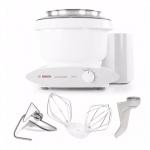
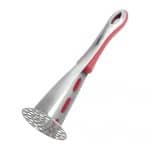
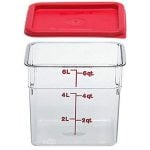
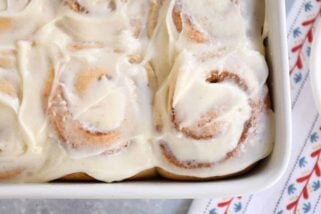
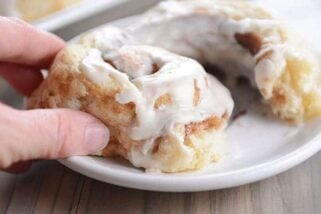
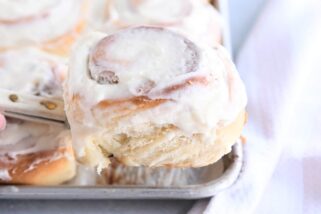
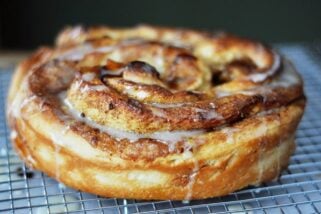
I’ve made a lot of different cinnamon roll recipes, yours and others, and these are my favorite!! When I double it though, do I double the yeast too or not fully double the yeast?
Hi Cristy, for this recipe, I’d recommend 1 1/2-ing the yeast for a double recipe.
I have had these cinnamon rolls saved on my Pinterest since the start of the pandemic. Every once and a while I’ll look at it longingly, because I love Yukon gold potatoes and cinnamon buns, but I am a horrible baker. Yesterday I finally made them. OMG their so good! So easy to follow because of the picture. That really helped me. The only issue I had was I did not oil my counter enough and they stuck a little, so they were kind of ugly, but thats on me. I gave some to my parents, sisters, grandparent, grandpas friend and 3 coworkers. Everyone love them. My grandfather who is a strict guy about his cinnamon buns said they were soooo good. (Thumbs up too.) Its safe to say this recipe is printed and will be on repeat from now on.
I should mention that I can’t eat dairy, so I used dairy substitute everywhere it called for dairy and you could not tell! I also added raisins!!!!
The texture of the dough is amazing. It just isn’t a very sweet dough. I feel like this recipe somehow mixed with Cheryl’s cinnamon rolls would be the perfect cinnamon roll. Frosting was delicious.
I haven’t made your recipe yet, but was wondering if 1 tablespoon salt is correct. It seems like a lot of salt for the amount of ingredients listed. Is it possible there was a typing error, and it’s suppose to be 1 teaspoon salt?
Yes, it’s correct. As noted in the recipe, it calls for coarse, kosher salt. If you are using table salt, you’ll want to use less (maybe 1 1/2 to 2 teaspoons).
Have you ever made this recipe using gluten free flour? If so, what brand of gluten free flour do you recommend? Working with gluten free dough can be challenging. Any advice you can offer would be greatly appreciated!
I haven’t – I’m sorry! I don’t think this recipe would fare really well doing a 1:1 sub of gluten free flour for the all-purpose flour. I think it would need other tweaks.
Favorite cinnamon roll recipe!!
Question though, could I replace the 1/2 cup of water for milk in the yeast mixture? Thank you!
You could definitely try that, Morgan!
These are delish! I make a quick cinnamon roll usually, only 1 raise time because I add baking powder. But, for a full 2 raise cinnamon roll these are wonderful. My husband is an avid gardener and raises hundreds of pounds of potatoes every year. Now I have another item to use them for
Ok…these are THE BEST cinnamon rolls! They were my first attempt at truly homemade-(I had only used frozen bead dough for my rolls in the past…sorry)! I will now be unable to go back. What a tasty Valentines Day treat❣️
I am wondering if these can be baked in an 8″ x 8″ cake pan with a 2″ height? I send them home with my kids to bake for their Christmas morning with their families. Or are they better if I use a baking sheet with a lower side? I made these once before and the recipe is amazing and my whole family is waiting for their Christmas morning cinnamon rolls – they are delicious.
Thanks
Lucky kids!! 🙂 yes you can bake them in smaller pans with higher sides, no problem.
These are so unbelievably good, especially considering I haven’t quite “mastered” them. Question—why do my layers separate and I end up with gaping crevices between all the folds?
That can happen for several reason – if the cinnamon roll log is rolled up too tightly and the dough is stretched, it can cause gaps while baking. Opening the oven during baking to check on the rolls can also cause gaps.
Awesome, thanks for the tip!!!!
By the way, I’ve been meaning to message you saying I used your recipes for ALL of my Thanksgiving dishes except one. As it was my first Thanksgiving not getting together with family (#Covid), I was really feeling the pressure. But Mel saved the day and it all came off without a hitch! You’re the best!
Oh, thank you so much, Celia! So proud of you!
Hey Mel! Quick question: What’s the reason for changing the temp from 425 (original Bon Appetit recipe) to 350? P.S. this is a genuine question for my own knowledge as I strive for cinnamon-roll greatness
Mostly because I’ve found in my oven that cooking my cinnamon rolls at super high temps resulted in dark brown edges and doughy centers so I reduced the temp so they’d bake more evenly. 🙂
These are the most tender and flavorful cinnamon rolls ever! I will definitely be making these again! I might even experiment with different fillings.
Mel……………. OMG! These are TO DIE FOR!! SO SOFT and delicious! My oldest son is an absolute stickler for cinnamon rolls and these delivered!! They are decadent.. not bready… so soft!!
I resisted the urge to add more flour. The dough IS VERY SOFT. But I refrigerated the dough overnight and let it rise there. It made rolling out the soft dough very easy. I also liberally floured the countertop so the soft sticky dough didn’t get stuck.
I think our regular vanilla pudding recipe (that I’ve used for almost 20 years!) has just been replaced with these…. WOW!
Hi,
I came across your recipe and it combines aspects of the flour for the filling and potatoes for the dough that I have wanted to incorporate (it seems like I am forever on the search for an even better cinnamon roll). I am excited to try your recipe. Do you think the dough would keep well enough in the fridge overnight after the first proof (if I wanted to do a bulk of the work the night before), or would making the rolls and letting them rise in the fridge overnight be better?
My preference would be to shape the rolls and let them rise in the refrigerator overnight.
Hey Mel- First off, my mom and I are HUGE fans and love everything you do! But we have a question! I’ve made this recipe before and think it’s by far the best cinnamon roll recipe out there, but do you think I could do the second rise in the fridge? Like an overnight version at step 14? Thank you so much!
Yes absolutely! Should work great.
Made these rolls! I was a little intimidated by cinnamon rolls, but I did it! It did take half a day with all the rise time included. But I got tons of compliments on the rolls, and they were SO soft! I also doubled the frosting and liked how much frosting that made. Great recipe if you have the time to make it 🙂
This has become the recipe I’m known for (I always give you credit!). My son is home from college this weekend and he requested “Mom’s Cinnamon Rolls” – which of course are yours. I’m so happy he has a recipe that means home to him, what a gift your website is!! I have made these at least 50 times (and I always double the recipe and freeze) and they have never failed. I have never had to alter recipe – it is perfect. I often teach friends baking and they have also had great outcomes with these cinnamon rolls (and Darcy’s sandwich bread). Thank you for a great recipe! A recipe I’m known for, and that my college boy comes home for! 🙂
Your comment made my day, Tammy!!
Hi!
Do you freeze after you bake and frost? or do you freeze after 2nd rise? I would love to give some to my family and any tips on freezing and then thawing and reheating tips would be greatly appreciated! I read Mel’s post about freezing rolls, but wonder what has worked for you and these specific rolls! TIA
Catherine,
I freeze after I cut the rolls – I’ve done in the pan and flash freezed on trays and then put in ziplock bags and both have worked great. I let them defrost and rise in refrigerator overnight (sometimes 2 nights if schedule changes) and then put on counter while I preheat oven. I add a few minutes to the cooking time – just watch them. Hope this helps! I’m making 3 double batches today to freeze and deliver Christmas Eve to friends for their Christmas morning.
-Tammy
Just wanted to say these are the BEST cinnamon rolls I’ve ever made! So soft and delicious!! And the frosting just puts them over the top! Gotta make these.
The only problem I have is that when I’m rolling out the dough, I find some small pieces of potato that didn’t get mixed in thoroughly so I pick them out. I almost wonder if I should use my hand mixer to mix them. Right now, I’m mashing them with a potato masher, then mixing the dough with my Bosch. When we cook them, you could never tell there is potato in them and they are fabulous! Just wondering on that though. It’s happened both times I’ve made them.
I actually throw the potato mixture, the butter, the eggs and the first cup of flour into my food processor and make it super smooth. That has worked well for me except then I have another appliance to wash, ha, ha. These are such good cinnamon rolls.
I have a flat potato masher. If you look at it from the side it is shaped like an “L.” It has a flat bottom with holes in it. There are no lumps in the potato mixture when I make these (works for super smooth mashed potatoes too and awesome for refried beans).
I like to use a ricer for my Yukon gold potatoes. I add butter after I rice them. Should I still stay at 2 1/4 cups?
Yes, I think so (but I don’t know how the added butter might affect the recipe)
I could not find Yukon gold potatoes at the grocery store I went to so instead bought yellow potatoes, but I don’t want to ruin the cinnamon rolls. Do you think that will still work?
Yes, I think they are the same thing.
These cinnamon rolls are the BEST EVER!! This is my second time making them. This time for company I had in town over the weekend and they loved them. Their son said Sunday morning he was hoping to get more of my cinnamon rolls for breakfast. And his mom asked how I learned to cook so well after trying them! Great recipes like this one!
The cinnamon rolls are light and soft and so delicious! I’d give it a 6 star rating if possible! I’ve tried several recipes before this one and they often were dry and more like bread than a bakery type cinnamon roll. I like that this recipe also has the amount of cinnamon and brown sugar just right for the filling! And my guests said the frosting is perfect (and it is)! Soo delicious!!
I’m so happy these cinnamon rolls are THE ONE! Thanks for the review, Linda!
AWESOME!!!!
Oh man. I’m going to get fat because of you. My mom discovered this recipe and now she makes them ALL the time. It’s just her and my dad at home so they eat a few and drop the rest off at my house. I know, it’s a pretty great deal. These cinnamon rolls are amazing. I’ve never made them because as soon as I get a hankering for them a batch shows up at my doorstep like magic. I’m so glad I introduced my mom to your blog because I’m digging this arrangement. Thanks!
Haha, you are one lucky daughter! 🙂
I’ve made a lot of cinnamon rolls in my day. This is definitely the best I’ve ever made. Seems to be hit and miss on the texture of the dough though. Maybe the temperature of the potato mixture when I add it to the yeast/water/sugar has something to do with that. Gonna try again today. My co-workers also think these are the best roles they’ve ever eaten. Thank you for the recipe!!
This is THE perfect cinnamon roll I’ve been searching for. Dense, moist, heavy, but springy – seriously amazing! The frosting is also the best I’ve made yet. I’m usually more cream cheese less butter but switching those measurements around made for the best icing I’ve had. I remember my moms making rolls/bread with mashed potatoes so when I saw this I KNEW that was what was going to give me the texture I’ve been searching for. Can’t recommend these enough!!!
Yum! I really wanted to try this recipe when it posted and I just got around to it. The dough is so soft, it almost melts in your mouth. I will definitely make these again-they are worth the extra steps.
I didn’t measure my potatoes before I boiled them (I used 2 large Yukon potatoes), but I did measure out the 2 1/4 c of mashed potatoes as the notes suggested. They turned out Awesome!!!!
Thanks for another great cinnamon roll recipe, there can never be too many of those in the world.
Oh my goodness! We all just died! The whole family is literally dead from eating them until we burst (figuratively speaking). These are so good. Frosting was perfect, although we didn’t wait the requisite 15 minutes because the smell insisted we begin consumption before they had cooled. The texture of the roll was so light and fluffy I fully intend to follow the links above to the dinner rolls.
Had no trouble with the flour quantity–6.5 cups about nailed it. I cut them to one inch and they spread out nicely but next time I’m going to give them a bit more height. The short stature had me believing I could muscle down a second helping and I really shouldn’t have.
Thanks so much for the report, Russell!
We have a cooking group that Russels’ wife is a part of and Russel came over and made these cinnamon rolls for all of us while we were cooking. WOW! I mean WOW! These were the best cinnamon rolls I’ve ever had, and I’ve consumed many a cinnamon roll . I immediately came to your site to check this recipe out, I can’t wait to make them! Thanks for sharing.
Made these tonight…they turned out great! In fact, my 15 year old said “I hope that I can find a wife who will be like you…and cook stuff like this!” I didn’t get too picky with measuring the potatoes. I just peeled and boiled 3 of them with the 2 cups water and then when I thought they were boiling too hard I turned down the temperature and when they were soft I mashed them with what water was left and didn’t measure. I added enough flour so it wasn’t sticking to the sides of the bowl and they turned out perfectly! I had a little harder time cutting them then my usual go to cinnamon roll recipe because the dough was a little stickier, but they still turned out beautiful and rose well enough that you couldn’t tell I had a harder time cutting them. I can’t wait to have another one in the morning and see how soft they are after sitting overnight!
Do you weight the potatoes before or after you peel them?
I weigh them before I peel them.
These were the most delicious cinnamon rolls I have made. I’m glad you added more details with your retesting because I felt like I should add more flour but didn’t know when to stop. Do you have a good tip for when it’s ready to stop when using the Bosch? Also, my husband wants me to bring some to work now that they’re so good, but he wants a mini version. Should I roll the dough out then cut it lengthwise in half then roll it? I’m wondering if I do that how long to bake them for? Have you ever made mini cinnamon rolls? I’m a new fan of your website and cooking! Love your fun commentary on each post!
Hi Linda! Thanks for your report on these rolls. Glad you enjoyed them! For the Bosch, my main rule of thumb is to stop adding flour once the dough clears the sides of the bowl and doesn’t cling in a sticky manner to the center (or sides). Hopefully the pictures in the post help with that a little. If not, feel free to ask for more details. For a mini version, I’d split the dough into three pieces, I think, and then roll out a smaller rectangle and make them that way. I’d probably check after about 10-11 minutes of baking?? Good luck!
Well….these rolls were an epic fail! I read all of the comments with tips and such….followed the recipe to a T measuring the potato mixture. I stopped adding flour at 7 cups so as NOT to over-flour. Dough was hard to handle, not as silky as i had anticipated. I premade them and put them in the fridge overnight. Well, that was a big mistake. It took 3+ hours to get to double in size. The flavor was nothing exciting. I will go back to Gloria’s recipe as they have never failed me. I think the extra effort of the potato mixture is overrated. Baked them Superbowl Sunday and by Tuesday they were not good. I will try again as I have a bag of Yukon Golds to use. Maybe a little practice will make them perfect! 🙂
Darn – sorry you didn’t love these!
I am looking forward to making these rolls. My favorite icing recipe calls for “browning” the butter. It makes all the difference in the flavor of the icing. I sometimes use coffee as the liquid in the icing. Gives it a whole new depth of flavor. 8 T. (1 stick) of butter browned, 4 c. powdered sugar, 2 tsp. vanilla, black coffee or milk to make spreading consistency.
For your icing, do you let the browned butter firm back up or use it while melted? Sounds yummy.
These were the best cinnamon rolls I’ve had. I made them egg & dairy-free, by using flax “eggs”, vegan butter, and vegan cream cheese. I made sure to measure the potatoes & water and allow the potato mixture to cool completely. They were so big, soft, and delicious. Thanks for the recipe!
Just one question I am using instant yeast so do I still add a half cup of warm water and the sugar
Hi Lorraine – yes, I still proof even when using instant yeast just for this recipe.
UPDATE: Ok, you guys, after many comments saying you had to add over 8 cups flour to the dough, I ran back into the kitchen to see what’s happening. For a bit of history, I’ve made this recipe probably 7-9 times and never had to add more than 6 1/2 cups flour (total). But there’s obviously some factor causing a lot of you to need to add extra flour, and I think I’ve figured it out.
First of all, it’s important to measure the potato/water mixture and ensure it doesn’t measure more than the recommended amount in the recipe (about 2 1/4 cups). Simmering vigorously at a high temp will reduce the water more – conversely, a lower simmer will leave more water with the potatoes. Keep it at a medium simmer and make sure the potatoes and water aren’t too far below or above the 2 1/4 cup amount.
Secondly, it is imperative that the potato/water mixture cools (almost completely or to a very lightly warm temp). I tested side-by-side batches of these and in the batch where I used the potato/water mixture right away, the dough absorbed quite a bit more flour (several cups). However, when I let the potato/water mixture cool (per the recipe; I’ve included a few more details about that in the directions), I stayed right around the 6 1/2 cups flour amount (that includes the 1 cup added to the potato/water mix). I’ve edited the recipe ingredients to indicate this, since the original flour amount was throwing people off. Mostly, keep an eye on the texture of the dough, like I describe in the paragraph above. This dough is going to be much softer than other yeast/cinnamon roll doughs, but it should definitely clean the sides of the bowl without leaving a lot of residue on your fingers (so even if you have to add 7-8 cups flour TOTAL, it’ll be fine as long as the dough isn’t overfloured – many factors, aside from the potato/water temp will contribute to flour amount, like humidity and elevation).
When adding flour to the recipe, it’s also important to let it mix fully before adding more – high moisture doughs benefit from a longer mix to fully absorb the flour (before needing to add additional). Thanks to Liz, a frequent commenter, for helping me troubleshoot that portion!
You’re awesome—you didn’t have to re-make these, as they’ve worked countless times for you (and other commenters as well), but you did anyway. Thank you!
hi Mel! How do you recommend these are stored? 🙂
I usually store them covered at room temp for a day or so (any longer and I pop them in the fridge, but they’ll definitely benefit from being lightly warmed up before serving).
Thanks so much! ps I have been using your recipes now since before my first was born and now he’s almost 6 and baby #4 almost here! Thanks for doing what you do!, Mel!
I love that you’ve been here for so long, Chelsea!
These are so, so good. I’ve made them twice now, and like other reviewers, both times I used 8+ cups of flour (I measured my potato/water gloop to make sure it was correct and cooled my mash) So glad you posted a picture of what the dough was supposed to look like, or I may have been tempted by the recipe’s suggested amount of flour to use less! My baking time was also quite a bit longer, probably because my rolls were monster-sized.
However, taste and texture were perfection and my mother-in-law is convinced I should open a bakery. Definite win, and will be made over and over again. Maybe my New Year’s resolution should have been “eat more cinnamon rolls” rather than to get in shape! Thanks for yet another delicious bake!
Haha, that would be a pretty rad new year’s resolution. Glad you like the recipe – your feedback is helpful. Thank you!
Does it work with russet potatoes? I make the Yukon gold version and they were amazing!! I don’t have any more Yukon golds so I wondered what difference russets would make.
That’s a great question – I think the answer is yes, but I haven’t tried it myself. I have to imagine it would work pretty well.
I tried a bread recipe last week that used potato flakes. I am thinking of trying it with these? (I’m trying to rotate food storage and use some potato flakes up.) Do you think it would be possible to use them in this recipe as well? What kind of consistency do I need to have the potato flakes/ water/butter mixture? Consistency of applesauce? Soup?
I would say the texture needs to be like thick applesauce.
It worked beautifully! Thanks for another great recipe!
Thanks, Megan!